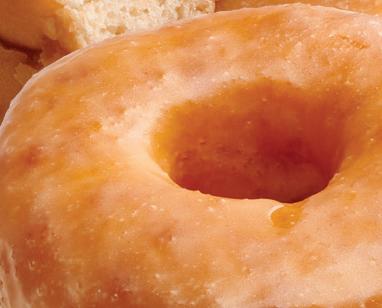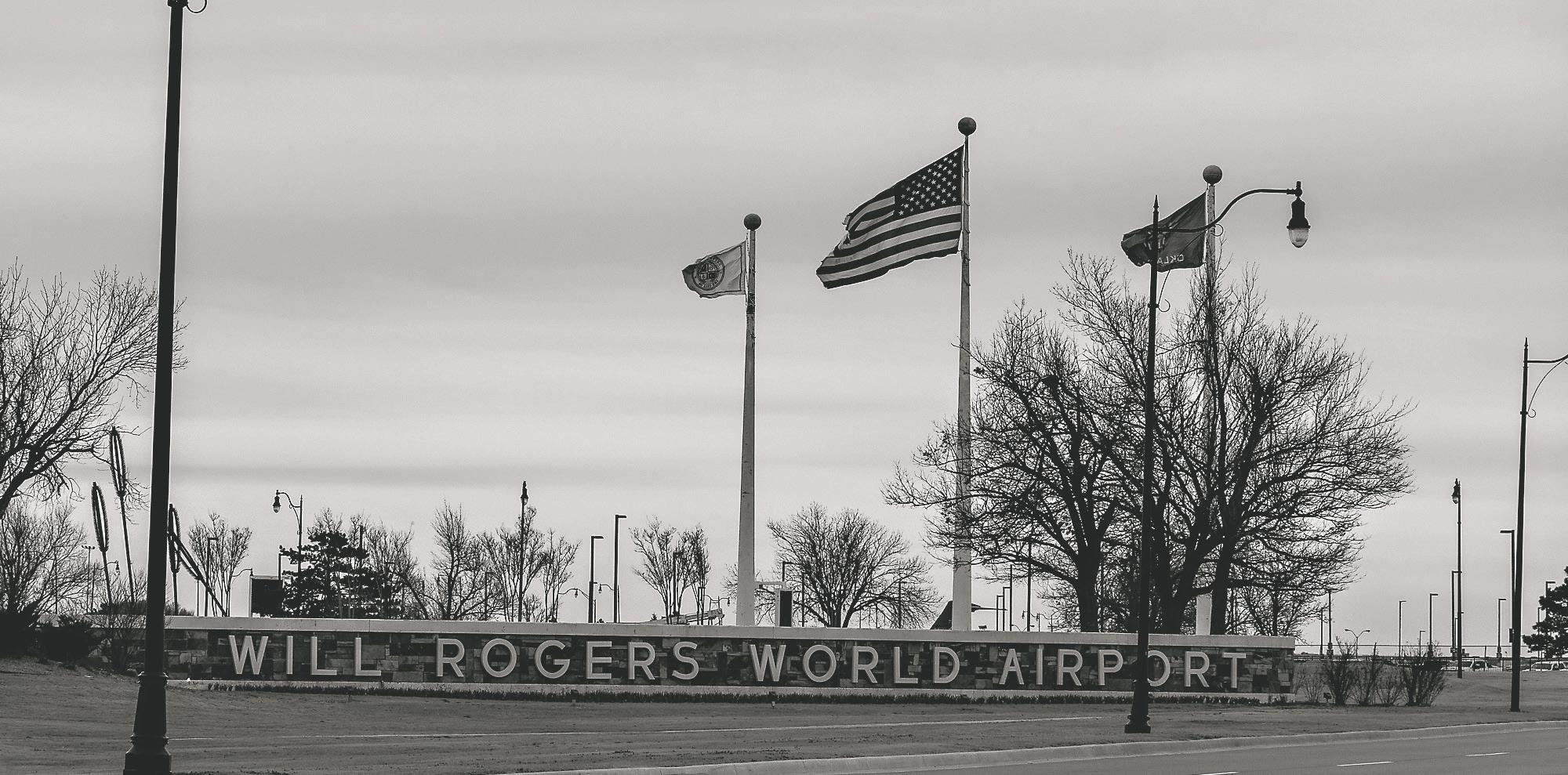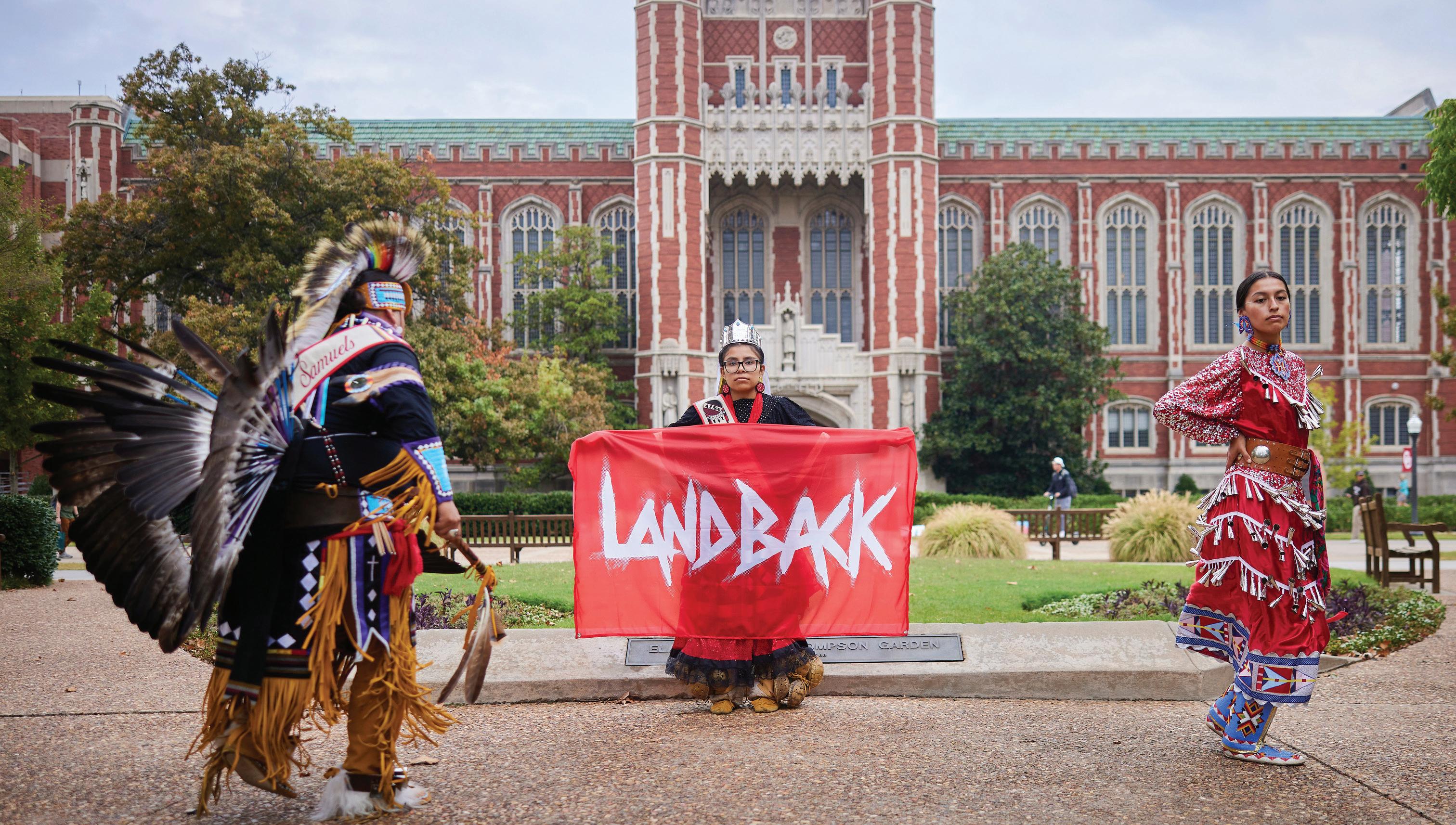Treasures of Oklahoma
Spring travels across the state
Faculty picks: Professors share favorite spots | Page 10
Tulsa: Gems of, and beneath, the city | Page 11
Oklahoma City: Unique locations north of Norman | Page 15










Spring travels across the state
Faculty picks: Professors share favorite spots | Page 10
Tulsa: Gems of, and beneath, the city | Page 11
Oklahoma City: Unique locations north of Norman | Page 15









OU Daily, the independent student voice of the University of Oklahoma since 1916, covers the community and provides a public forum to discuss its issues while providing students on our sta real-world media experiences.
JILLIAN TAYLOR
ALEXIA ASTON
AUSTIN CURTRIGHT
SILAS BALES
RAY BAHNER
FRANCISCO GUTIERREZ
CONNIE WIGGINS
SETH PRINCE
160 Copeland Hall, 860 Van Vleet Oval, Norman, OK 73019 BUSINESS OFFICE: 405-325-2521 | studentmedia@ou.edu
NEWSROOM: 405-325-3666 | dailynews@ou.edu
ADVERTISING: 405-325-2521 | dailyads@ou.edu
Letters to the editor or guest columns may be submitted to dailyeditor@ou.edu. ey will be edited for accuracy, space and style and run at the discretion of the editor-in-chief. Students must list their major and classi cation; faculty or sta must list their title. Our Views are the view of the Editorial Board. Opinions are not necessarily those of the Editorial Board.
One free copy is available to members of the community. Extra copies may be purchased. efts are subject to legal action.
e Daily is committed to accuracy. If you nd an error in our work, submit a correction at oudaily.com/corrections.


HOME PAGE
NEWSLETTERS
PRINT ARCHIVES
JOIN US
DONATE
SPORTS FACEBOOK TWITTER
SPORTS TWITTER INSTAGRAM
oudaily.com
oudaily.com/newsletters
oudaily.com/archive

oudaily.com/jobs

oudaily.com/donate
oudaily
ousoonerscentral
@oudaily
@oudailysports
@theoudaily
The American Banjo Museum educates visitors on the deep history of the banjo and its importance to American society. The museum was founded in 1998 by Brady Hunt and Jack Canine and was originally located in Guthrie, Oklahoma, before making its home in downtown Oklahoma City.
The exhibit starts with a 3D, life-size display of “The Banjo Lesson,” painted by Henry Owassa Tanner. The display features a boy sitting on his father’s lap, holding the oversized instrument while his father supports it from the neck.
Tanner was one of the first African American artists to rise to fame in the United States. The banjo was first created by enslaved people in the Caribbean as well as North America. This exhibit introduces patrons to the role of the banjo in the lives of enslaved people, the instrument’s early African American folk music roots and how the instrument changed over the next 400 years.
Walking through the museum is like moving through a timeline. As visitors follow the path laid out by the museum they can see the key moments in the history of the banjo, seeing the instrument develop in size and shape as well as genre and playing styles.

Lucas Ross has been the coordinator of community outreach and promotion at the American Banjo Museum since 2018.
“I’m very proud of it, and I’m proud for Oklahoma that we have it here, but it comes with the responsibility of carrying that legacy forward, carrying the history forward, the progress of it and the truths of it,” Ross said. “And I don’t claim to be an expert, but I try to approach every single day as: ‘What can I learn today?’”
The American Banjo Museum is located at 9 E. Sheridan Ave. in Oklahoma City. Admission is $8 for adults, $7 for students and seniors, $6 for children ages 5-17 and free for children under 5 years old.
South of Oklahoma City is the Skeletons Museum of Osteology. This exhibit focuses on animal skeletons found all over the world, and it displays over 450 specimens of active species.

The museum was originally founded by Jay Villemarette, who began collecting skulls when he was 7 years old. His original goal for the parent company of the museum, Skulls Unlimited, was to distribute and educate people about osteology. This dream eventually developed into the creation of the museum.
Ashley Mason-Burns-Meerschaert is the


director of museum operations and education at the Museum of Osteology. She was first introduced to the world of osteology watching the Discovery Channel.
“I came across this show called ‘Dirty Jobs’ with Mike Rowe, and they had an episode called, ‘Skull Cleaner,’ where he went to this place where they studied bones, skulls and anatomy, where they get to dissect and deflesh, and I thought, ‘Well that is the coolest thing I have ever even heard of,’” Mason-BurnsMeerschaert said.
Getting these bones and skeletons ready for the exhibit starts in the processing division, where the specimen is cleaned, whitened and sanitized before being articulated.
Along with other private events like birthday parties and holiday celebrations, the museum is also available for weddings. The building can currently occupy around 180 guests, but ongoing renovations may allow for more space in the future.
The Skeletons Museum of Osteology is located at 10301 S. Sunnylane Rd., Oklahoma City. Cost of admission is $12 for adults, $10 for kids and admission is free for children less than 3 years old.
Moving away from Oklahoma City, the Toy and Action Figure Museum located in Pauls Valley offers a unique museum experience.

The museum was founded in 2000 after a town meeting with the goal of improving the community over the following 10 years. The committee wanted to install destination locations unique to Pauls Valley. In 2005, it opened to the public and has become a staple of the downtown area.
Kevin Stark, a toy designer, collector and owner of the museum, started collecting figures in 1996. His collection has grown over the years through donations.
“I loaned my toys and the expertise, and the knowledge of being in the toy industry,” Stark said.
The first thing guests see when walking into the museum is the key feature, “The Adult Collectors” bedroom which displays hundreds of toys and action figures packed into a single room, lining the walls and floors. According to Stark, the toys have supposedly done something with the collector as he is yet to be found.
Other displays in the museum include Barbie, G.I. Joe, Marvel and Power Rangers figurines, along with many others. It is a nostalgic place for anyone who grew up with a favorite toy.
The Toy and Action Figure museum is located at 111 S. Chickasaw St., Pauls Valley. Admission is $7 for adults, $5 for kids and admission is free for children less than 2 years old.


Competing against pr 2022 Carter Bradley First Amendment A for work that aimed to r ound transpar
against professionals, the OU Daily was presented the 2022 Carter First Amendment Award,d to reset norms
around transparency at OU and in Norman. Its winning entry included stories that:
Its winning entry included stories that:
oudaily.com
Examined how the university handles records requests, including response times in comparison to other universities and resources available to the
Broke down data from the Nor man Police Department to show on a per capita basis, the city’s Black residents were three times more likely than their white neighbors to be contacted, arrested or have force used against them by the police.
Monitored the football team’s quarterback controversy via the jour nalism school windows near athletic department to institute a 72-hour national media blackout.

Wichita Mountains Wildlife Refuge offers plethora of new adventures, from scenic hikes to Biblical recreations
CHELSEA ROSE
chelsea.rose23@ou.edu
Nestled in the prairies of southwestern Oklahoma, the Wichita Mountains Wildlife Refuge is home to thousands of roaming wildlife species and a must-stop destination for roaming travelers.

From great heights like Mount Scott to low grounds like Forty-Foot Hole, the 60,000-acre refuge attracts visitors from all over with its views and various outdoor activities.
The Wichita Mountains Wildlife Refuge is the largest land-managed agency focused on wildlife and habitat. Established six years before Oklahoma’s statehood, the refuge’s mission never changed as the park grew.
According to the refuge’s website, its mission is to “administer a national network of lands and waters for the conservation, management and, where appropriate, restoration of the fish, wildlife and plant resources and their habitats within the United States for the benefit of present and future generations of Americans.”

This mission began in 1901 when President William McKinley established the refuge as the Wichita Forest Reserve under the General Land Office of the U.S. Department of the Interior’s Forestry Division.
In 1905, the refuge shifted under the U.S. Department of Agriculture’s Bureau of Forestry. That same year President Theodore Roosevelt proclaimed the Wichita Forest and Game Preserve as the United States’ first refuge housing big game animals under a congressional bill that authorized a federal wildlife refuge.
In 1907 the Wichita Forest and Game Preserve received 15 bison from the New York Zoological Park. Today, the National Park Service reported that 650 bison roam the refuge’s prairies, making the Wichita Mountains Wildlife Refuge the largest
bison refuge under the U.S. Fish and Wildlife Services.
In 1908, Rocky Mountain elk were reintroduced to the area, but until 1911, there was only one male.
By the end of 1912, 16 male and female elk joined the original male, according to the Rocky Mountain Elk Foundation. Today, around 800 Rocky Mountain elk graze the refuge.
The Wichita Forest and Game Preserve reestablished the Texas Longhorn cattle herd in 1927. The herd lives approximately 85 miles southwest of the University of Oklahoma and was brought in when the species was facing extinction. Thirty longhorns — 20 females, three males, three steers and four calves — were transported to the refuge that year, according to the U.S. Fish and Wildlife Service.
The Texas Tribune reported that most longhorns today share genetics with those at the Wichita Mountains, including one of the previous University of Texas Bevos, according to
The Alcalde, a UT alumni magazine.
In 1936, the refuge was renamed as the Wichita Mountains Wildlife Refuge. The change occurred after being transferred to the Bureau of Biological Survey, a former agency of the U.S. Fish and Wildlife Service. Meanwhile, administration of the refuge moved under the National Wildlife Refuge System. Throughout agency changes and attempts to grow animal populations, the refuge never lost sight of its mission statement that guides employees, Quinton Smith, a park manager, throughout work at the refuge daily.
“We are mandated by federal law to preserve and restore the habitat,” Smith said. “We get a lot of people who are confused on why they can’t do this or that, but that’s not what the refuge is set aside for. Learning how to recreate within that, have good environmental ethics and practicing ‘leave no trace’ are the best ways to interact with refuges and natural spaces
environmental ethics and practicing ‘leave no trace’ are the best ways to interact with refuges and natural spaces throughout the United States.”
A trip to the visitor center provides understanding of the reasons behind the refuge’s practices through educational boards and exhibits. The visitor center replicates the refuge’s wildlife activity with taxidermy and mimicked landscapes, educating travelers on the nature the refuge strives to preserve.

The refuge’s attractions all require time outdoors, but buildings, shops and restaurants throughout the refuge allow visitors a place to rest. For travelers looking for an abundance of fresh air and outdoor scenery, the Wichita Mountains Wildlife Refuge is a must-stop destination.
Known for its easy-to-navigate trails, the refuge welcomes dogs, children and amateur hikers to enjoy the Oklahoma wilderness.
“Everybody’s got to take a hike,” Smith said. “You need to get outside and explore what we conserve. If you’re only going to do one hike on the refuge, I would say Little Baldy near Quanah Parker Dam.”
Located in the Doris Campground of the refuge, Little Baldy is a 0.8 mile hike offering views of the Quanah Parker Dam and its waterways, the surrounding peaks and rocky landscape. AllTrails, a website with all need-to-know information for hikers, reported that the trail takes approximately 24 minutes to complete and is considered a moderately-challenging route.
AllTrails offers hikers the opportunity to rate trails, and raters gave Little Baldy a 4.5-star review. In comparison to the refuge’s other trails, Smith’s personal favorite ranks eighth. For those looking to hike trails with reviews just as good as their scenery, the Bison Trail ranks the highest with Forty-Foot Hole behind.
After a hike, visitors likely want to slow down and enjoy air conditioning. The Holy City of the Wichitas sits atop a hill lined with granite structures and has a history dating back to the

1930s despite its imitation of biblical times in Israel.
Every Easter the city hosts the nation’s longest-running passion play, “The Prince of Peace.” The play depicts the birth, life, death and resurrection of Jesus and has thousands of visitors in attendance annually.
Dena Briley has worked during the annual production for six years, and when she is not assisting with it, she works at the gift shop located in the city.
“Hundreds and hundreds of people come (to the play), and there was even a show that had more people come than what was at Woodstock,” Briley said. “Working during (the shows) is great. The energy is so fantastic, and everybody is in a great mood. Everybody’s always in a great mood when they come out here.”
No matter one’s religion, the spot offers sights representing a past era and showcases a part of countless people’s identity — a setting contrasting the Parallel Forest, another must-see destination at the Wichita Mountains Wildlife Refuge.
The Parallel Forest consists of over 16 acres of red cedar trees. Though a typical size for a forest, the 20,000 trees are located exactly six feet apart from one another in parallel lines, creating uniformity with trails in multiple directions.
The eerily tall and socially distanced trees are rumored to have been planted by the government to fight the effects of the Dust Bowl, though officials did not reach the solution they were hoping for as it was soon abandoned.
The Parallel Forest has a reputation of hauntings, urban legends and satanic rituals. A circle structure consisting of stones is located in the back of the forest, and is the only structure within the forest, reinforcing its notoriety.
A visit to the Parallel Forest may leave some feeling closed in, making a trip up Mount Scott in the open air ideal for the next stop.
Mount Scott stands 2,464 feet above sea level and is the
second tallest peak of the Wichita Mountains. Visitors can drive, bike or hike up the mountain to its summit.
The mountain’s peak offers aerial views of the Wichita Mountains Wildlife Refuge that visitors have no other method of seeing. From waterways to forestry to plains, Mount Scott is essential for travelers wanting to see the refuge’s entirety.
Lastly, Medicine Park is the go-to destination for visitors wanting a traditional tourist experience while still overlooking the scenery of the refuge. Labeled as Oklahoma’s first resort town, Medicine Park has various lodging, food and shopping opportunities.
After a day of exploring the refuge, Medicine Park visitors can enjoy an array of eating options, such as The Old Plantation Restaurant, the Riverside Cafe or Small Mountain Street Tacos. Visitors can visit the Comanche Shirt Co. for merchandise commemorating their visit or Cobble Scones Coffee Pastry, a combined coffee and gift shop.
Before calling it a day at a local hotel, a stroll alongside the Medicine Creek showcases the beauty of the town and allows visitors to soak in the day’s events.
Known for its plethora of activities for families, couples and solo travelers, the Wichita Mountains Wildlife Refuge is a must-stop destination for travelers looking to experience the Oklahoma wilderness.
The refuge’s options for travelers meet the demands of every type of person, including aviation sophomore Mackenzie Miller, with views that provide the satisfaction of a successful road trip.
“(The refuge) is free, so for college kids, it’s a pretty cool place to go,” Miller said. “It’s a really good opportunity to see the wildlife.”
With its peak seasons being spring and fall, the Wichita Mountains Wildlife Refuge expects to see countless visitors in the new year and provide them a trip to remember.
SILAS
silasbales@ou.edu
Just an hour south of Norman, Arbuckle Fried Pies is a classic pit stop for travelers going up and down I-35.
Opening in 1954 just south of the Arbuckle Mountains, the fried pie shop has been serving customers with a variety of savory, cream- and fruit-filled pies as they make their way down the interstate.
The original location of Arbuckle Fried Pies in Davis, Oklahoma, was bought in 1954 by E.W. Pletcher, but the land was leased to Texaco in the early 1970s, according to their website. After the lease ended, Pletcher reclaimed the land and took over operations of the gas station.
In the 1980s, the station added a restaurant to help with the struggling business, and featured fried pies on the menu.
When Pletcher moved to other ventures, his son, Jerry Pletcher, took the helm and started selling the pies from the station once again.
According to the website, pies were introduced to the station when business was struggling, and the business flourished as more focus was placed on the pies themselves. Now,
Arbuckle Fried Pies is enjoyed by Oklahomans across the state and beyond.

The original location is in Davis, but the company has branched out all across Oklahoma and beyond. According to their website, there are 13 locations across Oklahoma, Texas, Kansas and Arkansas, including Oklahoma City.
The original store is tucked away in the corner of a mountainside just before or after a large turn, so you can stop for a pie as you take the exit.
Arbuckle Fried Pies currently serves 22 different flavors of pie to satisfy customers’ taste buds. These include sweet fruit flavors like blueberry and apple, creamy pies filled with chocolate or lemon, and savory pies like the broccoli and chicken or the Tex-Mex. The company also offers several sugarless pie flavors in the fruit selection.
Michelle Swartzbaugh, manager of Arbuckle Fried Pies, said that the pies, made at every location, all start from the original in Davis.
“We make all our pies here,” Swartzbaugh said. “We make our own dough, the filling, everything. Pies are made every day. We get here at 6 and open at 7. All the locations get the ingredients and make the pies there, but it all comes from here.”
Because the company sells so many pies each day, they are made fresh every morning with more added throughout the day as needed, which adds up. Swartzbaugh said that they might go through 1,300-1,500 pies per day in the winter season, but it is significantly more hectic in the summers.

“Summertime, of course you have Turner Falls and we have
Falls Creek Church Camp just down the road, and for eight weeks they have 5,000-6,000 kids. So, we get a lot of people coming through,” Swartzbaugh said.
The store offers a large seating area decorated with various pictures from the store’s history, as well as an assortment of Western decals for anyone who needs a break from driving to sit down and indulge in a pie. Drinks are also sold to help wash down the food.
While travelers might want to stop and take a break to enjoy their pies at the original station, if they’re pressed for time the pies are in no danger of spoiling. Swartzbaugh said that the pies will last around seven days in the refrigerator.
While they do serve quite a few different pie flavors, Swartzbaugh said there are some clear favorites among customers, like the apple and chocolate pies, and that her favorite right now is pineapple. Among the savory options, the TexMex is among the most popular.
The pie shop is always adding new flavors to their classics. Blueberry was added just last year. The store also sells a few seasonal pies for when the holidays roll around.
“We used to have a beef and vegetable flavor, but it didn’t sell too well so we removed it,” Swartzbaugh said. “Our newest flavors have been blueberry and strawberry, and they’ve both been doing really well.”
Whether customers need a break on a long drive, want to discover their next must-stop spot or just need a sweet treat,
“The Wheeler District has this huge ferris wheel, and it’s really cool that it landed in Oklahoma City. It gives you an awesome view of downtown, and I think it’s something that everyone needs to visit. It gives you a new appreciation for the city when you can see it from that perspective. While you’re there you can hit Taco Nation, literally my favorite street tacos in the state of Oklahoma and some of the best queso I think I’ve ever had.”

Professors share their top picks for places to visit across the state
 SILAS BALES
SILAS BALES

silasbales@ou.edu

“My family goes to Lake Thunderbird quite often, and we hike the golden trails. There’s a little less than 20 miles or so around Lake Thunderbird, and once you really get into them, they’re quite remarkable. The Golden Loop is the trail that we frequent, but there are a number that are really great. It’s nice that it’s only a 15 minute drive from campus.”
“The Chickasaw Cultural Center is a really fun place to go and experience. There’s lots of buildings to visit and (the center) is not just something to see, but you really feel like you are absorbed into the culture. The people at the center are very nice, and I think it’s a place that not many people have visited. Not only the center itself, but the surrounding nature is really beautiful.”
HANNAH RYSTEDT
hannah.e.rystedt-1@ou.edu
Mother Road Market
Mother Road Market, Oklahoma’s first and only non-profit food hall, takes a large variety of restaurants and retail businesses and puts them all under one roof. With 14 restaurants, a full-service bar and a food truck out back, Mother Road Market has no shortage of flavor.
There’s no need to choose only one cuisine as the food hall has a unique array of options to satisfy every palate. Pick up an appetizer at Da Yolk, an entree at 1907 Barbeque and a dessert at Big Dipper Creamery. Mother Road Market provides countless combinations.
Located along Route 66, the food hall features popup shops, handmade baked goods and mini golf in the patio area. There is indoor and outdoor seating, with plenty of room for games and large group outings.
Mother Road Market is a development of the Lobeck Taylor Family Foundation, which provides locally owned, independent businesses a low barrier entry into the food service industry. Carly Fussell, public affairs strategist for Lobeck Taylor Family Foundation, said their goal has always been to serve the Tulsa community in the best way possible.
“We started Mother Road Market to give startup entrepreneurs a place to test and scale their business,” Fussell said.
Mother Road Market houses “Takeover Café,” a daily rotating pop-up restaurant, each with different concepts like Venezuelan arepas or gluten-free chicken and waffle bowls.
“Every single day there’s a different restaurant, and that’s what excites (visitors), because maybe they’ve
tried a lot of the restaurants inside Mother Road Market, but there’s (always) something new in the Takeover Café,” Fussell said.
Mother Road Market is made up entirely of locally owned businesses, which makes it a taste of Tulsa.

“We look for diversity of food and to support the next entrepreneurs making their way through the pipeline in order to start their business,” Fussell said.
Nicole Hood, a Tulsa resident and Mother Road Market visitor, said the environment and the different cuisines available are what keep her coming back.
“It’s food court style, but local restaurants,” Hood said. “And (it’s) kind of like home cooking, so everything seems really fresh, and it’s got a lot of different ethnic choices that you wouldn’t really find everywhere else.”
This unique experience encompasses the market’s motto of “Do Good x Eat Well x Shop Local.”
“We love that it’s on Route 66, too,” Hood said. “We like to explore Route 66 and try all sorts of different cuisines. It’s a really fun environment. They have mini golf out back and they have music, and it’s just a cool place to come and try out.”

Fussell said Mother Road Market aims to bring comradery to the Tulsa community. Their stacked event calendar mirrors their expansive food selection. They host tailgates, movie screenings, karaoke, brunch club and more from their large outdoor patio.
“We really want to rally the community around food, events and a family-friendly place that everyone can enjoy,” Fussell said.
Mother Road Market is located at 1124 S. Lewis Ave. in Tulsa, and is open from 11 a.m. to 9 p.m. Tuesday through Saturday. Upcoming events can be found on the Mother Road Market website.
Deep below downtown Tulsa, under its towering buildings, lie a network of tunnels with a rich history. These tunnels connect office buildings, parking garages and a Hyatt hotel beneath the downtown area. Most of the tunnels are accessible to the public, and you can explore them yourself or take a guided walk-through.
Jeffrey Tanenhaus, Tulsa Tours founder, said the indoor corridors were built as a result of the oil boom in order to connect the buildings that are “testaments to Tulsa’s global importance in the early 1900s.”
“They were primarily created for the convenience of office workers to get from building-to-building or to parking garages without having to contend with the very changeable Oklahoma weather,” Tanenhaus said. “Now there’s an exception. … A historic tunnel between two buildings in the downtown that were built by Waite Phillips.”

During the 1920s and ‘30s, Phillips built three important buildings in Tulsa, all with his name on them: The Philbrook Museum of Art, the Philtower and the Philcade. Phillips had Oklahoma miners dig two tunnels between the Philcade building, where he lived, and the Philtower, where he had his office, so that he and his family could travel safely from either building.
“They are legitimate, historic tunnels and were (built) for (Phillips’) safety and convenience because, at that time, being that wealthy was risky, and in the era of organized crime and kidnappings, both he and his family were targets of kidnappers,” Tanenhaus said.
Phillips’ motive was to safely commute and export his money to the bank without fear of being attacked, a necessary measure due to his wealth.
“It’s an easy commute,” Tanenhaus said. “You would just have to cross the street, but back then it was really too dangerous for him.”
While that may not be necessary today, the tunnels are still enjoyed by residents for an underground adventure, convenience or protection from the weather.
Only one of Philips’ two tunnels still remains available to the public. Tanenhaus said this tunnel is saved for the end of the tour and is the highlight of many visitors’ experience because it is “legitimately creepy.”
“The tunnel between the Philtower and Philcade is not as well lit,” Tanenhaus said. “It is more confined, it’s old and looks kind of creepy. So it’s different and it’s cool and people certainly like that the best. Everybody likes a good creepy tunnel.”
Rest assured, Tulsa tunnel explorers will not be in dangerous conditions. Tanenhaus said headlamps are not necessary, nor is crawling through tight spaces, as most of the tunnels are climate-controlled, well-lit and spacious.
“(Visitors) would get a newfound appreciation for Oklahoma in general and Tulsa in particular by learning about what a player Tulsa was 100 years ago,” Tanenhaus said. “Learning about (Tulsa’s) history and going through these buildings really brings you back to an era you can’t really imagine.”
For locals and visitors alike, there is so much history to learn and new sights to see underneath downtown Tulsa. To book a tour with Tulsa Tours, visit their website.
Inside a quaint, unassuming house on the corner of a North Tulsa neighborhood is “The Outsiders” legacy. With a collection of prized memorabilia, autographed walls, an exact replica of the movie set and frequent visits from the cast, it is a dream for a fan of the film or novel.
The museum opened in 2019 and since then, people from all over the nation have come by to see the movie set for themselves. The coming-of-age movie features the struggles of Ponyboy Curtis and his greaser friends as they try to navigate life as “outsiders” to society. The candid portrayal of hardship and loyalty has connected Oklahomans since 1983.
Michael Fellwock, volunteer coordinator for the museum, said the closer visitors are to where S.E. Hinton wrote the novel in Tulsa, the more personal connections they can make to the movie and its set.
“It’s a collaboration through donations, things we’ve got from actors, things we’ve gotten from local people and things from collectors,” Fellwock said.
While “The Outsiders” has firm roots planted in Tulsa, Fellwock said he has seen people from all over the world come to the museum.
Joe Cervantez, an extra from “The Outsiders” film adaptation and a volunteer at the museum, said the Tulsa community has played a major role in completing the museum.
“It took a lot of the community to help with it and to raise money,” Cervantez said. “A lot of labor supplies and materials were donated to help the effort to restore the house.”
Cervantez said he loves to share experiences on set with museum visitors and show them his film photographs of the cast and crew.
“I didn’t think Tom Cruise was going to amount to anything with that ugly tooth he had,” Cervantez said. “So I thought, ‘Oh, he’s not going to be anybody, so no need to waste my film on him.
“Where are y’all from?” is likely the first thing they will hear upon walking into the museum.
“We get a lot of people from all over the country,”
Cervantez said. “People from every state and some foreign countries. We get young and old alike. Seems like everybody really likes the movie and can identify with it, too.”
While some of the filming locations have been torn down and changed, Fellwock said that it’s amazing how much of the scenery has been preservered.
Filming locations in the area are well known to Tulsans and can be easily recognized while watching the movie. Within walking distance from the museum, visitors can see multiple filming locations, such as the intersection where Dallas met his fate and Crutchfield Park where Ponyboy nearly met his.
The home of the Curtis brothers displays multiple costumes that were worn on set, international posters and book copies, as well as prop replicas scattered throughout the museum.
“There’s a magic to this place,” Fellwock said.
The Outsiders House Museum is located at 731 N. St. Louis Ave. in Tulsa, and is open from 11 a.m. to 4 p.m. Friday through Sunday. For more information, visit the Outsiders House Museum website.


A 10 minute drive north of I-40 lies the town of Gore, Oklahoma. The town is dubbed the trout capital of the state, sitting a mile east of the Arkansas river.
Gore is home to an Oklahoma hidden gem, Emily’s Tearoom & Bakery. The quaint dining spot on the north corner of Railroad and Main streets has occupied one of the town’s original buildings for over two decades.

On a cloudy, winter Saturday morning, the tearoom is halfway full within thirty minutes of opening. The joyful buzz of conversation mixes with the tinging sound of porcelain cups returning to their saucers. The it is full of warm light and cheery color, and the walls are decorated with eclectic artwork.
Founder and owner Kim Barnes makes her rounds, greeting her regulars, welcoming new faces and helping everyone find a seat.
Emily’s Tearoom & Bakery opened in 1996. Barnes said she started the tearoom to support and spend more time with her children.
“I worked as a paramedic for years, and my kids were becoming young teenagers, so I knew it was time to come home and be with my children,” Barnes said. “At first, I was just going to have a shop. I didn’t have a clue what I was going to do.”
An English tearoom is a rare find in rural Oklahoma. Barnes said the concept was inspired by her heritage. Her mother grew up in Wing, a town 40 miles north of London, and Barnes learned to cook classic English dishes from her aunt.
“My love of my tearooms comes from my English heritage and being able to go to many tearooms in England,” Barnes said. “I’ve probably been about 20 times. My mom is English, so we’d always go back and forth to England and go out to the tearooms.”
Emily’s Tearoom & Bakery is composed of two high-ceiling dining rooms. The front door opens into the tearoom’s original dining space, and a variety shop occupies a section of the space to the right. The doorway to the second dining room is flanked with intricate wooden doors, and connects to the tearoom’s kitchen. Barnes said the tearoom started small, but that the growth of the business was never her focus.
“I did all the cooking and everything by myself and now, as you can see, that can’t be done. It started just for my children,” Barnes said. “ I had one customer the first week and four tables. I never dreamed that it would grow, I never even thought that far. That wasn’t even my goal. It outgrew me.”
Barnes’ determination is clear in the environment of the tearoom, and has led to her creating a successful and beloved eatery in a town with just under 1,000 residents. The dining rooms reflect the aesthetic of traditional London tearooms
and the eclectic décor demonstrates Barnes’ resourcefulness and creativity as a businesswoman.
“The little tea rooms in England all have the little skirts on the tables and this and that. I do love my tearooms in England,” Barnes said. “But this is just what I had to put together, and a lot of times it was because of my budget. If I found a table or some chairs or something at a good buy, that’s what we’d get.”
The walls of the tea room are decorated with paintings from Barnes’ favorite artists, friends and herself. In one corner, Barnes created a ceiling-high mural of a patisserie, and she painted and waxed the floors to look like gleaning hardwood. Barnes said she created the large painting of Audrey Hepburn with the tail of a mermaid.
“I painted her when I was bored one night,” Barnes said.” I couldn’t find anything to paint on, so I took the legs off of a table.”
English tea rooms serve scones, pastries and small sandwiches. Barnes said that she began with a traditional menu but purchased a grill when she realized she needed to expand to appeal to more guests. Emily’s Tearoom & Bakery serves English classics, including scones and Yorkshire pudding along with more typical American options.
“We make burgers and Reubens and patty melts. We have a nice full menu because that’s how you bring the men in,” Barnes said. “We do a quiche every day, that’s a staple, and it’s homemade. We do a different soup every day of the week.”
Barnes started the tearoom on her own and still works on every aspect of the business.
“I’m an electrician, I’m a plumber, I’m the loan officer. I used to do all the cooking but that outgrew me.”
One of the challenges of a small town is the ability to find employees to staff the tearoom.
“I’ve always been blessed, but there’s been times that I would have to work in (the kitchen) for days,” Barnes said. “I have osteoporosis. So it’s really hard on me, but I still love cooking.”
Barnes’ sister, Debra Young, has worked alongside her
“I love my tea room and then the friends I’ve made and being part of the community.”
KIM BARNES, FOUNDER AND OWNER
at the tearoom for around two decades, and helps balance Barnes’ workload.
“She’s been here with me for years and it keeps me going,” Barnes said. “Because if she sees me going towards the kitchen, she’ll be like, ‘Stay out, I’ve already been in there.’ She has a good personality.”
The tearoom has its fair share of regulars, but guests also travel from across the state to dine. Barnes said the community is one of her favorite things about her business.

“As far as the business goes, I love my tea room and then the friends I’ve made and being part of the community,” Barnes said. “That community is very important to me because I’ve been here so many years. And they say I’m very important to them, too.”
Emily’s Tearoom and Bakery is open 11 a.m. to 2 p.m. Tuesday through Thursday, and 11 a.m. to 3 p.m. Saturday. Information and their menu can be found on their Facebook and website.
A 5-minute drive from Emily’s Tearoom and Bakery is Marval Resort, another of Gore’s hidden gems.
The town of Gore is already quiet by nature, but the resort is almost entirely secluded, being a third of a mile off the highway. The 105-acre campground is nestled into the foothills of the Oklahoma Ozarks, on the shore of the Lower Illinois river.
Winding gravel roads lead visitors from the general store at the front to a wide range of lodging, activities, amenities and the river.
Gore is dubbed the Trout Capital of Oklahoma, and the fishing access at the resort rings true to the title. The Lower Illinois is a designated fishing river, and guests can find rainbow and brown trout, record stripers, walleye, crappie, catfish, and bass in the resort’s mile of riverfront.
The resort offers a variety of lodgings with prices that make the experience widely accessible. Tent campsites begin
“It doesn’t really need advertising. It stays so full, constantly. You never go hungry. When I go to check on things, I get asked, ‘Have you eaten anything? Are you hungry?’ from the little ladies outside cooking whatever. I’m not selling the place, I’m just telling you the real deal. These people love their jobs, and I understand why.”
at $30 a night, and cabins with nearby restroom access begin at $81 a night. Starting at $148, cabins include their own restroom, stovetop and sink. The resort also offers larger lodges with full bathrooms and kitchens. All campsites have a picnic table and fire ring, and all cabins and lodges have a source of heat. All overnight guests have access to a bathhouse, coin laundry and free Wi-Fi.
Marval Resort has a range of activities. Guests have access to mini golf, an arcade, a sand volleyball court and a trampoline pillow. The Stargazer Theater backs up to the forest, complete with bleachers and a swimming pool is open in the warmer months.
The resort hosts themed weekends throughout the year. Stacie Degraffenreid, Assistant Manager of the resort, said that her favorite is a summer event called Water Wars. The resort hosts three weekends of Water Wars due to popular demand. Participants wear red and bring their water-launching equipment to join the battle.
“The fire department comes down and sprays everybody,” Degraffenreid said. “It’s amazing.”
The resort has themed events planned every weekend from March through Labor Day. March 10-19 is the resort’s Spring Break and St. Patrick’s Day celebration. Guests are encouraged to bring decorations to enter in the golf cart and bicycle decoration competition. The events also include a scavenger hunt and St. Patrick’s Day parade around the
property.
Degraffenreid said the resort is incredibly popular.
“It doesn’t really need advertising,” Degraffenreid said. “It stays so full, constantly.”
Many guests bring their RVs to the resort for long-term periods. Degraffenreid said the campgrounds have a strong community environment.
“You never go hungry,” Degraffenreid said. “When I go to check on things, I get asked, ‘Have you eaten anything? Are you hungry?’ from the little ladies outside cooking whatever.”
Degraffenreid said that she has never enjoyed a job more than she does in her position at the resort. She said that all the employees enjoy being heavily involved in the property and activities.
“I’m not selling the place, I’m just telling you the real deal,” Degraffenreid said. “These people love their jobs, and I understand why.”
Information and updates about Marval Resort can be found on their Facebook, and a schedule of events and booking is found on the website.
The Jones Assembly is a one-stop shop for food, drinks, events and concerts in downtown Oklahoma City on historic film row.


Annie Tucker, director of marketing, said there’s truly nothing like the experience The Jones Assembly provides.
“Our three pillars are food, spirits and music,” Tucker said. “The way we pull off those three things simultaneously is so cool to me.”
The Jones Assembly is a 20,000-square-foot building boasting a dining room for brunch and dinner, a full service bar, a patio and an upstairs event area.
The brunch menu features a specialty savory ricotta hot cake with Nashville hot chicken, appetizers like scratch biscuits served with honey butter and fresh jam and brioche french toast, a spin on a classic.
The dinner menu includes Italian favorites like lasagna made with pork sugo and rigatoni with whipped ricotta, various salads and steak. An array of specialty cocktails like the Jones Crush and Disco Nap are available, as well as an extensive wine and beer list.
Tucker said the restaurant functions as a full service fine dining restaurant one day and a casual concert venue the next. Both the dining room and patio are often converted into concert venues and party areas.
“We move all the furniture and everything around to be able to provide that to guests and clients,” Tucker said. “I haven’t seen anything like it.”
One of the Jones Assembly’s most recent events was the TJ Après pop-up, a monthlong alpine food and beverage experience on the patio, which ran from Feb. 4 to March 4. Tucker said the patio was set up to feel like a ski lodge and featured an exclusive menu.
“We completely overhauled our patio to make it feel like a ski lodge,” Tucker said. “We’ve created a new type of reservation to sit out there, with a specialty menu only for the patio. We have DJs and music out there on the weekend, then all the while we’ve got the dining room running as normal. The food and drinks are so fun, the space looks amazing. A completely different experience than I’ve seen at any other place in (Oklahoma City).”
The Jones Assembly hosts several annual events and parties as well. The annual St. Patrick’s Day party will be hosted March 11.
“We’ll have all the usual things going on, plus a full themed party,” Tucker said. “We’ll have green beer, Irish-themed food specials and music.”
Concerts at The Jones Assembly have featured artists like Lord Huron, Flatland Cavalry, Hippo Campus, Andy Grammer and Randy Rogers.
Starting up in April, The Jones Assembly hosts The Lively Concert Series from spring through fall. This series features local musicians playing on the patio stage every week, Tuesday through Friday from 5:30-8:30 p.m.
“We started this after Covid to provide local musicians with a gig and our guests with free live music,” Tucker said. “It’s sponsored by Lively Beerworks, a great brewery close by that we work with.”
Tucker said The Jones Assembly aims to bring in people
from outside Oklahoma City, such as Edmond and Norman, and that the venue is full of entertainment for all ages.
“It’s great on the weekends for kids, great late at night for college kids, 20-somethings and 30-somethings,” Tucker said.
The Jones Assembly is open 4-11 p.m. Tuesday and Wednesday, 4 p.m. to 12 a.m. Thursday, 4 p.m. to 2 a.m. Friday, 10-2 a.m. Saturday, and 10 a.m. to 10 p.m. Sunday.
Whether it’s for a meal, happy hour, an event or a concert, there’s always a reason to go to The Jones Assembly. For more information, visit their website or Instagram.
Hideout Art, an abstract art school and gallery, is one of Oklahoma City’s hidden treasures, located in the Britton District.
Oklahoma resident Lisa Allen owns the studio. She has loved art her whole life and intended to major in it in college. However, she ended up majoring in communications, following a different career path.
Allen grew up in Oklahoma but went to Stephens College in Missouri, graduating in 1991. She bounced around cities for two years, then lived in Kansas City until finally moving back to Oklahoma City in 2001 after the birth of her second child. During these years, Allen worked as a corporate trainer for Revlon, traveling and training other employees to promote their growth and skills.
“I loved what I did but hated the travel part,” Allen said. “I was in a different city every day. I could not have a life like that.”
Allen then worked in pharmaceutical sales from 200307. She later worked as a personal trainer, fitness instructor manager and fitness instructor of indoor cycling and water aerobics.
One day, her neighbor asked her to teach him how to paint, and she taught him on her back porch. Allen soon realized that painting there was a huge mess and wouldn’t work long term.
“I realized I needed a place to paint that wasn’t my back porch,” Allen said. “I was literally driving around looking for places to rent and saw the for lease sign draped over what is now the Hideout Art sign. I called the owner and it turns out I knew him — Ward Hall.”
Allen opened Hideout Art in 2018. Allen said Hall helped her get a head start on materials for the space.
“Ward gave me the remnants from the school down the street, so I have all the cool coat racks,” Allen said. “The studio is all kind of cutesy with a lot of color. It’s definitely my happy place.”
Allen said she had always loved painting but couldn’t tap into her creative side. She wanted to learn how to let her personality shine through her art.
“I’ve always painted all my life,” Allen said. “I was always a brush artist. Everything was cool, but it was exact. I was great at copying other people’s art, but I couldn’t get any creativity to come out of my brain. But if I could just go out there with my personality, I could.”
Allen said the use of different tools, especially trowels, small handheld tools with a flat pointed blade, are what finally let her get creative.
“It really started for me when I started painting with trowels, doing some ridiculous, fun, easy, modern pieces,” Allen said.
Allen said she can teach others how to channel this creativity within themselves. She teaches lessons on how to paint modern canvases with these trowels and other tools.
“Hideout Art became such a fun place, not just for teaching a single lesson, but it’s super therapeutic,” Allen said. “The things I show you are so easy, memorable and doable. It’s so fun, even for someone with no artistic skill whatsoever. They may come in and do some badass, modern minimalist piece that nobody saw coming. The sky’s the limit on these. It really allows people to be artists right away.”
Allen has a very open studio environment and said she wants people to make the most of the experience, making themselves at home.
“I allow people to bring and use their medical marijuana, and they can also bring any wine and beer they want,” Allen said. “I also encourage them to bring any snacks they want. A lot of people will have a party here and cater. And now we’ve got El Coyote down the street. I’ve watched this whole district open, it’s crazy. Over the past five years, it really came alive.”
Allen said she her father, mother and sister have died, but one of her favorite memories at Hideout Art was getting to paint with her family members who are still alive. She said she knows the joy other families get to experience together when painting in the studio.
“My favorite moment was when my family, who was alive, was there and we did a family painting where we literally just loaded up the big trowel, and had a huge painting,” Allen said. “I literally just let them do whatever. I wanted us to do something huge and bold, and it turned out amazing. Experiencing that with my family who I love. … I know that’s what it’s like for the other people who come to paint here.”
Allen said people become connected through the studio. Many friendships form through the love of art.

“Our business is really word of mouth,” Allen said. “Everybody is connected. It’s like a spider network of friends
now. I’ve met the most wonderful people and that’s what I love the most. It’s been such a blessing, and has even helped people get into, or get back into art.”
Guests are able to book the space for parties through the Hideout Art website, but Allen said it’s also a great way for family and friends to spend time together while creating something.
“It’s the chillest place,” Allen said. “There’s paint on the floor. It’s a hot mess, but a really cute adorable hot mess. They walk in not being an artist ever, and leave with an incredible, big abstract painting. I’m there to help guide, but I let people do whatever they want. You have to let go. It’s a weird cool thing to watch.”
Hideout Art is truly unique to Oklahoma City. The studio teaches innovative techniques, has a strong community, and is a place for creative expression, all because of the one-of-akind Lisa Allen. For lessons and to learn more, visit Hideout’s website or Instagram.
The National Hotel is a historical Oklahoma building turned hotel located at the corner of Park Avenue and Robinson Street in Oklahoma City.
Originally the First National Bank tower built in 1931, the National Hotel was restored and reopened in April 2022 as part of the First National Center Project. The hotel’s tower stands 456 feet above the sidewalk. The hotel has preserved and maintained many elements of the original building, including murals, cast stone, stone columns, vault doors and safes, keeping the history of the bank alive.
Jason Gifford, the general manager, said even Oklahomans should still come stay. The hotel has so much more to offer than rooms to sleep in.
“Whether you’re visiting or from here, it’s something that is so unique, it should be on everyone’s list to at least walk in,” Jason Gifford said. “We want you to stay a night, enjoy the restaurants, shop.”
The hotel features 146 guest rooms, with 16 suites and a presidential suite. The lobby features historic murals by Edgar
Spier Cameron and original marble floors The Great Hall bar.
“The Great Hall’s very unique. It’s a beautiful Roman-esque depiction,” Gifford said.
The hotel features restaurants like Tellers Italian WoodFired Grill and Stock & Bond steakhouse. Tellers uses traditional Italian cooking techniques for an authentic meal. Stock & Bond stays true to Oklahoma’s history by serving a modern interpretation of High Plains steaks paired with American whiskey.
The Gilded Acorn is another eatery, with indoor and outdoor seating, that serves small plates, champagne, coffee and tea. Library of Distilled Spirits, located in the hotel’s basement, serves liquor inside the iconic bank vault. The Library contains over 1,500 spirits from all over the world and over 200 cocktails.
The hotel also has an array of retail shops just a few steps away, inluding Plenty Mercantile: The Reserve, offering a line of locally sourced and sustainable goods, including jewelry, bath and body products, apparel, candy and home decor; The Barbershop and DryBar, both hair salons; and Lucchese Bootmaker, the largest Lucchese location.
“You have the hotel, residences, food and beverages,” Gifford said. Add in Stock & Bond steakhouse, the retail shops, the Acorn and the Library of Distilled Spirits. … It is just such a fun and unique property.”
The hotel hosts several meeting venues, like their 7,096 square-foot ballroom. These rooms are ideal for business meetings and corporate parties.
Other amenities include a fitness center, valet parking, room service and smart TVs in guest rooms. The hotel is also pet-friendly.
The National Hotel is more than a place to stay with a multitude of amenities. The building is an integral part of Oklahoma’s history.
“The building is so special, with so much history behind it and what it took to get this building where it is to be represen-

Isabella.A.Stonecipher-1@ou.edu
Near the southeast tip of Oklahoma lies Beavers Bend State Park. It was established in 1937 and is one of the original state parks of Oklahoma.
Despite the park including beavers on their list of residents, the furry creatures are not the origin of the park’s name. The park was instead named for John T. Beavers, a Choctaw citizen by marriage to Leuvina H. Beavers, who was born in the Choctaw Nation. In 1930, the land they lived on in southeastern Oklahoma was sold to the Choctaw Lumber Company. The company, named for but not owned by the Choctaw Nation or any of its members, sold the land to local community leaders, who in turn donated it to the state, so it could become Beavers Bend State Park.
Broken Bow Lake lies just northeast of Beavers Bend. Construction on the synthetic lake began in 1968, and it was opened to the public in 1970. Fishing, kayaking and canoeing are just a few activities available on the water. The perimeter of the lake is also very well known for camping and hiking. Broken Bow Lake is 22 miles of clear water and amazing views.
The stereotype that Oklahoma only displays flat prairie land and dull sights is broken by the park’s beautiful forests, lakes and wildlife. Taylor Nelson, spokesperson for Oklahoma Tourism and Recreation, emphasized just how important this area is to the state.
“It’s a really fun and special place because when you think about Oklahoma, you don’t necessarily think about the amazing scenery that you see down in the Beavers Bend or Broken Bow Lake area,” Nelson said. “It’s just gorgeous.”
With the spring tourism season at hand, cabins, campgrounds and lodges are quickly filling up in anticipation of incoming visitors. The prospect of spending time outdoors is tempting to many Oklahomans after December’s intense temperatures. Lodging is available in the park, as well as the surrounding areas of Broken Bow, Hochatown and Broken Bow Lake.
Some of the more popular trails offer outdoor exploration for anyone seeking adventure, or just a pleasant walk through nature. Friends Loop Trail Head is 1.5 miles long and moderate in pacing. This trail presents hikers with several fantastic lookout points, and takes about an hour and a half to complete. Other routes include the Tree Trail, which begins right next to the Beavers Bend State Park Forest Heritage Center and Museum, and the Cedar Bluff Nature Trail which offers a more relaxed hike.

The Forest and Heritage Center is a great spot in the park for history buffs. The museum leads visitors through a circular route that features displays and works of art about the history of forestry. The museum also hosts an impressive display of wood art and is attached to a small gift and novelty shop for last-minute items before you hit the trails.
Beavers Bend State Park not only brings in Oklahoma residents, but also many tourists from the surrounding states of Texas and Arkansas who are eager to make the trip to the picture-perfect Kiamichi mountains. The local and newly official town near Beavers Bend has relied on this extra tourism in order to achieve its goal of township.
Hochatown received township status on Nov. 28, 2022. This community sits right outside the state park and offers tourists a variety of activities to explore, ranging from live music at the Hochatown Saloon, to Hochatown Bigfoot Axe Throwing, to drinking at Girls Gone Wine.
Hochatown offers a variety of dining options as well. Abendigo’s and the saloon are both great options for anyone looking for musical entertainment while having a meal. The Eat Out offers seating options in its backyard surrounded by a circle of vintage campers, or at its bar lined with wooden rope swings.
With increasing tourism in the area, many small businesses have started to pop up. Hochatime is a local clothing and accessory store founded by Jessica Alkirwi and Kim Kennedy. The store has become a unique staple of the area, coining a catch phrase that captures the nature of Hochatown, “Livin’ on Hochatime.’’
Starting out in 2015, the company originally sold out of a renovated school bus. Realizing their business might soon
outgrow the traveling venue, Alkirwi and Kennedy moved the shop to a more permanent location at 9231 N. U.S. Highway in Hochatown.
A 28-foot RV, affectionately named Betty White, was established inside the store as a nod to the original pop-up school bus. Being too long to comfortably fit inside the building, Betty White now peeks through to the outside of the store facing the highway. Customers are welcome to walk through the RV, which has now been renovated into a children’s toy and clothing section of the shop.


Kennedy said Beavers Bend and Hochatown are a gold mine for anyone with a love for being in nature.
“I think that what this is all founded on is being in the outdoors,” Kennedy said.
Another local business that resides near the park is Rugaru Adventures, established in 2016, which offers zip lining and all-terrain vehicles. The word Rugaru comes from the French phrase loup garou, which means “werewolf” and is part of Métis, an Indigenous nation in Canada of French and Cree descent. Guests are able to enjoy stunning views and tours of the state park through unique and unforgettable experiences offered by the company.
Amanda Norman is an employee with Rugaru Adventures and has worked with the company since 2017. Norman commented on the variety of experiences the area of Beavers Bend and Hochatown have to offer.
“There are thousands, literally thousands of acres out here of forest land,” Norman said. “So you can come here (Hochatown), have the resort experience, go out and eat at restaurants and stuff. But then you can go just a few miles away from here and really be in solitude if you want to be.”
Norman says she has seen the most amount of growth in the area in the past five to ten years, similar to what Kennedy, co-owner and founder of Hochatime, acknowledged as well.
Rugaru Adventures is located at 2658 Stevens Gap Road in Broken Bow. The company is open for booking from 9 a.m. to 5 p.m. and has tours that last for about two hours. Pricing varies from $85 to $95 per person depending on the type of tour booked.
“It has grown exponentially in recent years, and that has helped the community surrounding the park to thrive,” Nelson said. “It had more than two million guests visit Beavers Bend State Park in 2021 alone, and that has generated $71.6 million in spending throughout the state.” Nelson said.
Hiking, camping and other outdoor activities can be hard to find in the Norman and Oklahoma City area without taking a mini road trip. And while a three-and-a-halfhour drive might be enough to scare some people away, Beavers Bend is a rewarding trip for anyone willing to make the journey.
“It really is one of those hidden gems in Oklahoma that you wouldn’t expect to find. Gorgeous scenery, a nice relaxing atmosphere, but just 10 minutes from the park or less you can enjoy a winery, zip lining, bowling, all the things that you might expect to enjoy in a big city,” Nelson said.
In the digital age where many college students have started to spend a large portion of their time online between academics and social ties, it can be refreshing to embrace the outdoors for a screen break. Beavers Bend offers just that and promises more only a few hours away from campus.
“For our kids in college who are from Oklahoma, and those who might not be from Oklahoma but have chosen to come to Oklahoma for this time in their lives, it’s really important for them to get out, explore, understand the history of where they are living and where they are from, and just enjoy what is around them,” Nelson said.
Beavers Bend State Park is an iconic part of Oklahoma and is, perhaps, an area that many people are still learning about. It is a location that provides residents with fresh air and an escape from their busy day-to-day lives. From family trips to solo adventures this place has something for everyone to enjoy.
ISABELLA STONECIPHER/OU DAILY



Editor’s Note: While this magazine focuses on places to visit in Oklahoma, many will be traveling across the country and beyond for the break, so this story focuses on more extended journeys.
The COVID-19 pandemic changed a lot about how people’s lives operate on a day-to-day basis, and many industries have been changed to look different than they did three years ago, and the travel industry is no different.

In 2019, the travel industry had a total of $1.17 trillion put into the United States economy, according to the U.S. Travel Association. When the pandemic hit, the number dropped significantly. In 2020, it dropped to $722 billion, and in 2021, it was $886 billion.
This year is a different story. According to the U.S. Travel Association, in 2023, the expected spending in the travel industry is $1.05 trillion, and it’s expected to finally return to the spending from 2019, with an expected spending of $1.15 trillion.
With an increase in spending comes an increase in travel, once again, but the way people are traveling might look different than before.
Sebastian Modak, a freelance journalist and former 52 Places traveller for The New York Times, said he thinks the travel industry is in a period of change that hasn’t been seen before.
“I think people are looking at travel a lot closer to home.
They’re looking at less conventional places for escape or vacation,” Modak said. “They’re thinking differently about what it means to take a vacation.”
Modak said this might be because, after two years of the pandemic, many people miss human connection and are factoring that in more to their travel.
Modak isn’t the only one saying this either. In a survey done in the middle of the pandemic about what people want their next trip to feature, the top answers were: “Get to know other cultures more deeply” and “Meet new people/make friends”, according to World Packers.
Students at the university are no exception to this trend. Arturo Ochoa, biomedical engineering sophomore, has traveled to various spots since the pandemic restrictions have let up, including visiting family in Mexico, doing a studying abroad with programs in Italy, and then visiting Austria and Spain. Ochoa said when he is traveling, he wants to gain something he can’t get back home.
“I want to have experiences and see different cultures,” Ochoa said. “Culture expands your mind. The way people function in other societes — how something can be normal here and not over there — that’s what I want to experience.”
Ochoa is not alone in this. According to the Booking.com 2022 Sustainable Travel Report, out of 30,314 respondents from across 32 different countries, 66 percent of travelers want to have an experience that is representative of local culture,
and 25 percent of people are willing to pay more for activities they know will give back to the local community in some way. Modak said that many people might be asking themselves new questions when coming up with their next destination for a vacation.
“I think (the pandemic) made us rethink everything,” Modak said. “It’s made us rethink the carbon footprint of our travel, what we do when we’re on the ground. Does every vacation need to be at an all-inclusive resort? There’s nothing wrong with that, but maybe when people are planning their next trip, they’ll think about engaging more somewhere, they’ll wanna spend a lot more time outdoors. There’s been a lot that I think has been changing people’s values around travel, and why they travel.
According to Claire Newell, founder and president of Travel Best Bets in an article by Today, many people looking to travel want to support the local community and are choosing not to stay in chain hotels, rather to eat and stay in local spots and shop from local stores. The 2022 Sustainable Travel Report says that a third of travelers in the report said they are looking for a more locally relevant experience.
Many people are also trying to change their travel plans to help support the environment. According to the Booking.com


2022 Sustainable Travel Report, 81 percent of global travelers say that sustainable travel is important to them, with 50 percent of those saying that recent climate change news had led

As pandemic worries wane, people seek return to vacationing, gaining new experiences abroad
SILAS BALES silasbales@ou.edu
them to make more sustainable travel choices.
The report also says that many people want to travel outside of peak seasons to avoid overcrowding, or choose an entirely different destination altogether that is less popular. However, 42 percent of people say they struggled to find an appealing destination that is less crowded.
Not everyone is keen to go to back to normal, however.
Lena Ross, a psychology senior at OU, said that while she has traveled and lived in Japan before the pandemic, she is still cautious of the risks involved. Ross, said while she has traveled to Japan, a country she used to live in, since the pandemic has started to lighten up, she is still cautious of the risk involved.
“Before 2019, I used to go to Japan every year, and then because of COVID-19, I had to take a two year break,” Ross said. “When I was able to go back again, it was mostly the same, but there were a lot more rules. It wasn’t as easy to travel there.”
Ross didn’t mind the extra steps, however, saying that she feels like the U.S. doesn’t care about COVID-19, and she appreciates that Japan still does.

“The whole time I was there, we’re required to wear masks, we’re told not to go out if you feel sick at all, but here, I feel like COVID-19 has been gone for, like, a year,” Ross said. “Nobody really wears masks, and people still go out even if they feel sick. I’m that one person that is still wary of COVID-19. I still wear my mask everyday. The minute I don’t feel good at all I stay at home, and I feel like I’m the only one who wears a mask.”
Ross said that visiting another country where masking is still normalized is makes her feel more comfortable.
“Here, I’m standing out by wearing a mask, and even at work, I’m the only one,” Ross said. “Customers will say, ‘Oh they’re making you wear that?’ and I have to clarify: ‘No, I get sick easily, and I’m scared of COVID-19,’ but when I was over there everyone was wearing a mask. It would have been weird if I wasn’t wearing a mask.”
While these restrictions still may be common in Japan, across the globe this is not the case. Most countries have removed their mask mandates and COVID-19 travel restrictions, aside from a select few. Indonesia, Pakistan, Myanmar, Angola, Azerbaijan, Liberia and Ghana are still closed to U.S. citizens who are not fully vaccinated, and various other countries require visitors to quarantine no matter their vaccination status or negative test results.
When travel starts to change, the content written about it will change as well. Modak says that the pandemic helped propel changes that were much needed in the travel writing industry.
“I think (travel writing) is still in the process of figuring out what it is now, but it definitely has changed,” Modak said. “I think some of the changes were already underway. Maybe not a direct product of the pandemic, but also around the conversations around Black Lives Matter protests and everything else. A, a lot of industries, including travel writing, took a look at themselves and asked, ‘Are we really representing the world at large?
Are we representing everyone when we talk about the world?’ And I think the answer was largely no. It’s good to see places shining more of a light on local voices, on marginalized voices, on the voices we haven’t heard in an industry that’s largely been dominated by white dudes.”
Modak says that while this isn’t a direct result of the pandemic, it did give many people a shock to their systems and helped propel it to the limelight, and can hopefully encourage people to rethink why we travel.
“I hope that this means we will move beyond the bucket list approach to travel, where we all need to go to the same place at the same time of year, to take the same photos to post to Instagram. I think that’s gonna become a thing of the past, as we try and have more meaningful experiences when we travel.”
While it may look a bit different than before, the travel industry is growing and will soon to reach the heights it had prior to the pandemic, although those heights may be spread out over a variety of different places, rather than the all- inclusive resorts and luxury cruises that have historically been seen on Instagram for years and years. In the post-pandemic age, the new travel may be more local, more community focused and more culturally diverse at all stages of the trip.





























AGO AT OU
Hiking at OU has been a pastime for students for a long time as a good way to take a step back from studies and embrace nature.
Lake Thunderbird.
In the Nov. 28, 1923, issue of OU Daily, hiking was described as “Soonerland’s popular sport,” and “ ... something of that inborn love of beautiful nature.”
OU Daily reported that hiking was popular among couples, but many men and co-ed groups preferred it over an afternoon at the movies.
According to OU Daily, late November through the holidays was peak hiking season for Oklahomans looking to “fnd solace in nature’s playground.”
On Nov. 18, 2010, OU Daily reported about the hobby and recommended various spots across Oklahoma, including the Ouachita Mountains, Wichita Mountain Wildlife Refuge, Black Mesa State Park and

OU Daily reported that hiking is a good way to grow friendships and one’s experience with nature.
Professor Allen Knehans, chair of the department of nutritional sciences, said it’s important to stay hydrated and energized while hiking.
“For the hiker, I would say water (is) a frst priority, Knehans said. “The fact that they’re almost certainly being more active in a typical day — there’s more sweat, losing fuids.”
Khenans also recommended bringing snacks while you hike to maintain energy like an orange or banana, along with a packed meal.
10 Take in or let out
11 Arm-twisted
12 Usually
13 “That’s a terrible thing to do!”
18 French name pronounced “eve”
22 Recycling container
24 It abuts N.D. and S.D.
25 Make amends
26 Italian greeting
28 Chess “castle”
35-
32 Fingerprint feature
33 Haw’s partner
34 Snaky swimmers in the Sargasso Sea
36 Voyage
37 “Shoo!”
38 “That wasn’t a good idea”
39 Without assistance
40 Getting just right
43 “My bad!”
44 More than you can count
45 Accept the decision of
47 The “S” of GPS: Abbr.
48 NASA telescope launched in 2021
50 Singer Kravitz
51 Architectural add-on
52 Pester persistently
56 Sitar music pattern
58 Fled or bled
59 Rage
60 Many MIT grads who studied circuits
March 9-12: Future Voices
Oklahoma City Ballet, tickets online for $20.
March 10: Natural World Exhibit
The Resonator
March 10: Second Friday
Norman Art Walk
Walker Arts District
March 10-12: Jurassic Quest
Oklahoma City Fairgrounds, tickets online
March 11: Norman Wine and Craft Festival
Cleveland County Fairgrounds
March 11: Be Our Guest (DJ Disney Night)
Tower Theatre, $18-22
March 11 and 18: Winter Market Saturdays
The Well
March 15: Science of Sci-Fi
Sam Noble Museum, $25 for members, $30 for nonmembers
March 16-17: Squid
Oklahoma Contemporay, $15.76
March 17: BJP St. Patricks Day Show
Bluebonnet Bar
March 17: ShamROCK the Gardens
Myriad Botanical Gardens
March 19: Disco Doom with AJ Harvey Opolis, $10
Instructions:
Fill in the grid so that every row, every column and every 3x3 box contains the digits 1 through 9. That means that no number is repeated in any row, column or box.
1 Type of sprout in salads
2 More sordid
3 Fusses over
4 Magical Egyptian goddess
5 Toon frame
6 Paid to play poker
7 Welsh ___ (dog breed)
8 Poetic alternative to “afore”
9 Go kaput








































